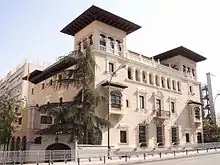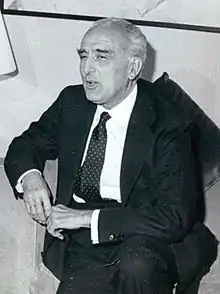Spanish Ombudsman
The Spanish Ombudsman or Defender of the People (Spanish: Defensor del Pueblo) is the ombudsman of the Cortes Generales responsible for defending the fundamental rights and public liberties of citizens by supervising the activity of public administrations.
| Spanish Ombudsman
Defensor del Pueblo | |
|---|---|
.svg.png.webp) | |
| Style | The Most Excellent (formal) Mr. Ombudsman (informal) |
| Nominator | Cortes Generales |
| Appointer | Speaker of the Congress Speaker of the Senate |
| Term length | 5 years |
| Constituting instrument | Spanish Constitution |
| Formation | 1981 |
| First holder | Joaquín Ruiz-Giménez Cortés |
| Deputy | First Deputy Ombudsman |
| Salary | € 119,755.23 per year[1] |
| Website | https://www.defensordelpueblo.es/en/ |
The ombudsman is created by the Constitution and regulated by an Organic Law of 1981. He or she is nominated by both the Congress of Deputies and Senate through a joint committee that chooses the candidate and proposes him or her to the Chambers. The candidate must be approved by three-fifths of both Chambers. If these qualified majorities are not reached, a new joint committee must to be formed to choose another candidate or to maintain the previous one but the second must to get in a second voting three fifths of the Congress and an absolute majority of the Senate. To be chosen ombudsman it is necessary to be a Spaniard, adult and having the full enjoyment of one's civil and political rights.
The Ombudsman ceases by resignation, expiration of the term of appointment, by death or disability, by acting with gross negligence in compliance with the obligations and duties of the office or by having been convicted, by final judgment, for willful misconduct. In the case that the office is vacant, is the First Deputy Ombudsman who assumes the office as Acting Ombudsman.[2]
Prerogatives and incompatibilities
Prerogatives
The Ombudsman will not be receive instructions from any authority. It will carry out its functions independently and at its discretion.
The Ombudsman will enjoy absolute immunity. He can not be arrested, disciplined, fined, persecuted or judged on the basis of the opinions he formulates or the acts he performs in the exercise of the powers inherent to his position. In all other cases, and while he remains in the exercise of his functions, the Ombudsman can not be detained or retained except in the case of flagrante delicto, corresponding to the decision on his indictment, imprisonment, prosecution and trial exclusively to the Criminal Room of the Supreme Court.
The above rules will be applicable to the Deputy Ombudsmans in the performance of their duties.[2]
Incompatibilities
The condition of Ombudsman is incompatible with any representative mandate; with any political office or political propaganda activity; with the permanence in the active service of any Public Administration; with the affiliation to a political party or the performance of directive functions in a political party or in a union, association or foundation, and with the employment at the service of them; with the exercise of judicial and fiscal careers, and with any professional, liberal, mercantile or labor activity.
The Ombudsman must cease, within ten days following his appointment and before taking office, in any situation of incompatibility that may affect him, understanding otherwise that he does not accept the appointment.
If the incompatibility occurred once the position has been taken, it shall be understood that he resigns on the date on which it occurred.[2]
Subordinates
The Ombudsman is assisted by a First Deputy and a Second Deputy Ombudsman, in which he can delegate his functions and who will replace him by order, in the exercise of the same, in the cases of temporary impossibility and cessation. The Ombudsman shall appoint and separate his Deputies following the approval of the Cortes Generales in the manner determined by their Regulations. The Ombudsman may freely appoint the extra advisors necessary for the exercise of their functions, in accordance with the Regulations and within budgetary limits. People who are in the service of the Ombudsman are considered as a person at the service of the Cortes Generales.
The deputies and advisers will automatically cease at the moment of taking possession of a new Ombudsman.
The deputies have the same prerogatives and incompatibilities and the same requirements to be chosen Deputy Ombudsman as the Ombudsman.[2]

Work area
The Ombudsman not only looks after the fulfillment of the human rights in the General State Administration but also in the regional and local administrations. He or she can do so ex officio or by the request of a third party. When the Ombudsman receives complaints regarding the acting of the Administration of Justice, they should be redirected to the Public Prosecutor's Office so that the latter may investigate its reality and adopt the appropriate measures in accordance with the law, or transfer them to the General Council of the Judiciary, according to the type of claim in question; all this without prejudice to the reference that in his general report to the Cortes Generales can do to the subject.
The Ombudsman will also ensure respect for the rights in the scope of the Military Administration, without it interfering in the command of the National Defense.
Coordination with regional ombudsmen
With the evolution of the different regional administrations during the Spanish transition to democracy, numerous bodies similar to the Ombudsman were created and it was necessary to regulate the competences and relations between these bodies and the State Ombudsman and this was made by a Law in 1985.
The protection of the rights and freedoms in the regional level can be made in coordination between the regional Ombudsman and the State Ombudsman. If the administration who made the violation of human rights is the State Administration acting in the region, the State Ombudsman has priority but may ask for assistance of the regional ombudsman in order to be more efficient as well as giving him a copy of the final report with the investigation.[3]
List of Ombudsmans
- Status
| No. | Portrait | Name | Took office | Left office |
|---|---|---|---|---|
| 1º |  |
Joaquín Ruiz-Giménez (1913–2009) |
30 December 1982 | 30 December 1987 |
| - | _Felipe_Gonz%C3%A1lez_conversa_con_el_defensor_del_Pueblo._Pool_Moncloa._15_de_marzo_de_1993_(cropped).jpeg.webp) |
Álvaro Gil-Robles Acting Ombudsman (1944–) |
30 December 1987 | 16 March 1988 |
| 2º | _Felipe_Gonz%C3%A1lez_conversa_con_el_defensor_del_Pueblo._Pool_Moncloa._15_de_marzo_de_1993_(cropped).jpeg.webp) |
Álvaro Gil-Robles (1944–) |
16 March 1988 | 16 March 1993 |
| - | .svg.png.webp) |
Margarita Retuerto Buades Acting Ombudsman (1944–2005) |
16 March 1993 | 1 December 1994 |
| 3º | .jpeg.webp) |
Fernando Álvarez de Miranda (1924–2016) |
1 December 1994 | 1 December 1999 |
| - | .svg.png.webp) |
Antonio Rovira Viñas Acting Ombudsman (1952–) |
1 December 1999 | 15 June 2000 |
| 4º |  |
Enrique Múgica Herzog (1924–2020) |
15 June 2000 | 30 June 2010 |
| - | .svg.png.webp) |
María Luisa Cava de Llano Acting Ombudsman (1948–) |
30 June 2010 | 21 July 2012 |
| 5º | _(2).jpg.webp) |
Soledad Becerril Ombudsman (1948–) |
21 July 2012 | 21 July 2017 |
| - | .jpg.webp) |
Francisco Fernández Marugán Acting Ombudsman (1946–) |
21 July 2017 | Incumbent |
References
- Pueblo, Defensor del. "Retribuciones | Defensor del Pueblo". Defensor del Pueblo (in Spanish). Retrieved 2018-09-17.
- "Organic Law 3/1981, of April 6, of the Ombudsman". www.boe.es (in Spanish). Retrieved 2018-09-17.
- "Law 36/1985, of November 6, which regulates the relations between the Institution of the Ombudsman and similar figures in the different Autonomous Communities". www.boe.es (in Spanish). Retrieved 2018-09-17.